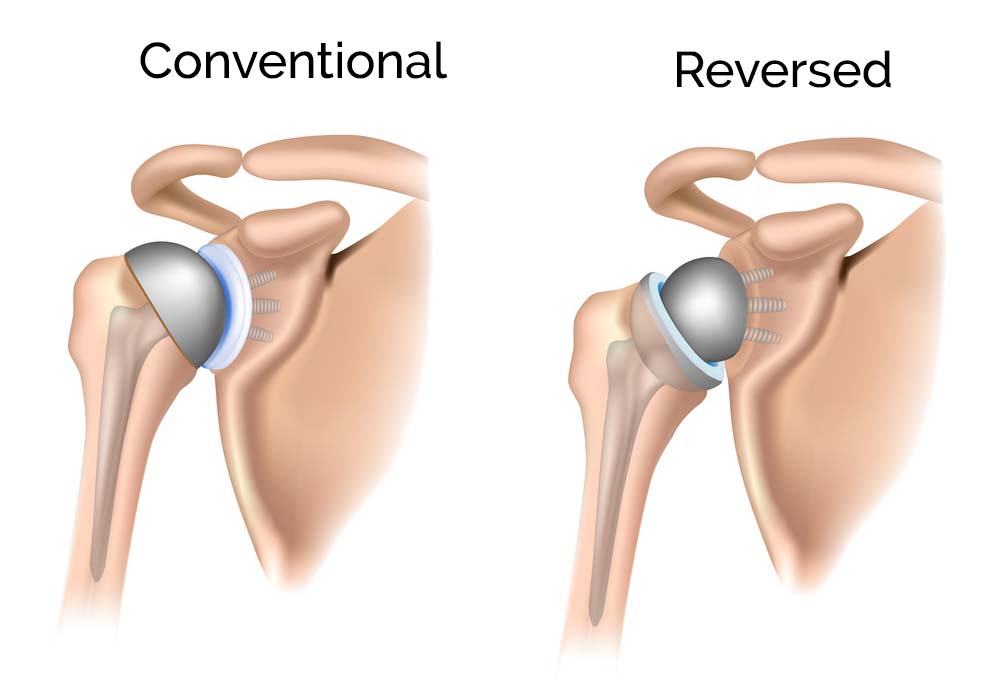- Home
- reverse Shoulder Replacement
reverse Shoulder Replacement
Reverse Shoulder Replacement
Every year, thousands of conventional total shoulder replacements are successfully done in the India. for patients with shoulder arthritis.
However, this type of procedure is not as beneficial for patients with large rotator cuff tears who have developed a complex type of shoulder arthritis called cuff tear arthropathy. For these patients, conventional total shoulder replacement may result in pain and limited motion, and reverse total shoulder replacement is a better option.

Description
A conventional shoulder replacement device mimics the normal anatomy of the shoulder: A plastic cup is fitted into the shoulder socket (glenoid), and a metal ball is attached to the top of the upper arm bone (humerus). In a reverse total shoulder replacement, the socket and metal ball are switched. The metal ball is fixed to the socket, and the plastic cup is fixed to the upper end of the humerus.
A reverse total shoulder replacement works better for people with cuff tear arthropathy because it relies on different muscles to move the arm.
In a healthy shoulder, the rotator cuff muscles help position and power the arm during range of motion. A conventional replacement device also uses the rotator cuff muscles to function properly. In a patient with a large rotator cuff tear and cuff tear arthropathy, these muscles no longer function. The reverse total shoulder replacement relies on the deltoid muscle, instead of the rotator cuff, to power and position the arm. It essentially re-creates the function of the torn rotator cuff.
BOOK AN APPOINTMENT
You Don't Have To Live With Pain
Dr. Rahul Bade is a specialist Knee & Shoulder Surgeon.
Candidates for Surgery
Reverse total shoulder replacement may be recommended if you have:
- A completely torn rotator cuff that cannot be repaired
- Cuff tear arthropathy
- A previous shoulder replacement that was unsuccessful
- Severe shoulder pain and difficulty lifting your arm away from your side or over your head
- A complex fracture of the shoulder joint
- A chronic shoulder dislocation
- A tumor of the shoulder joint
Your doctor may also recommend surgery if nonsurgical treatments, such as rest, medications, cortisone injections, and/or physical therapy, have not relieved your shoulder pain
Candidates for Surgery
Your orthopaedic surgeon will help you plan and prepare for your shoulder surgery.
Medical Evaluation
Most patients must have a complete physical by their primary care doctor or internist before surgery. This is needed to make sure you are healthy enough to have the surgery and complete the recovery. Many patients with chronic medical conditions, like heart disease, must also be evaluated by a specialist, such a cardiologist, before the surgery.
Medications
Be sure to talk to your orthopaedic surgeon about the medications you take. Some medications may need to be stopped before surgery. For example, the following over-the-counter medicines may cause excessive bleeding and should be stopped 2 weeks before surgery:
- Non-steroidal anti-inflammatory medications, such as aspirin, ibuprofen, and naproxen
- Some arthritis medications
If you take blood thinners, either your primary care doctor or cardiologist will advise you about stopping these medications before surgery. Additionally, certain types of rheumatoid arthritis medication may need to be stopped for a period of time.
Home Planning
Making simple changes in your home before surgery can make your recovery period easier. For the first several weeks after your surgery, it will be hard to reach high shelves and cupboards. Before your surgery, go through your home and place any items you may need afterward on low shelves.
When you come home from the hospital, you will need help for a few weeks with some daily tasks like dressing, bathing, cooking, and laundry. If you will not have any support at home immediately after surgery, you may need a short stay in a rehabilitation facility until you become more independent.


